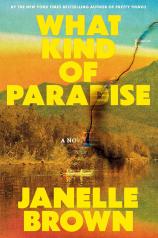What Kind of Paradise
Review
What Kind of Paradise
Janelle Brown, the New York Times bestselling author of PRETTY THINGS and WATCH ME DISAPPEAR, delivers her most gripping, thought-provoking and haunting novel yet. In this ripped-from-the-headlines domestic drama, a girl raised by her isolationist, conspiracist father discovers that while the bars of her gilded prison may have protected her from his version of the world, they have robbed her of everything else.
Once upon a time, Saul Williams was a triple-degree Harvard grad and a Silicon Valley mastermind, rising from his impoverished roots to rub elbows with the smartest, most innovative minds in the world. Now, he lives in the backwoods of Montana, kills deer for food, and instructs his teenage daughter on everything from tending chickens to Russian philosophy and the evils of the American government. Jane may chafe against his strict teachings from time to time, but she also adores him; he is all she has ever known.
"I would argue that WHAT KIND OF PARADISE should be required reading, a work of fiction that functions nearly as nonfiction, akin to Kim Brooks' SMALL ANIMALS or Tara Westover's EDUCATED."
In addition to indoctrinating Jane into his way of thinking, Saul distributes a monthly zine called Libertaire, which boasts almost 50 subscribers, all of whom believe in him and his message: technology, far from being the great equalizer, is a way to oppress the masses and make them compliant sheep. Everything from romance novels and lipstick to cafes and frozen pastries is part of this great machine of control, which will end humanity as we know it. Or so he tells Jane.
When we meet Jane, she is starting (though she doesn’t quite realize it yet) to grow wary of her father’s beliefs, or at least of his all-encompassing paranoia. On the night of her 17th birthday, for example, she is treated not to cake and gifts, but to a middle-of-the-night alarm that “they” --- the Feds --- have found them and it’s time to flee. Only after Jane rushes out of bed, packs her survival bag, crawls into her father’s secret tunnel and out into their shed, which contains a button that will detonate the cabin they call home and everything in it, does she learn that it was just a drill. “We do these drills so that we can both survive,” says Saul.
But what, or who, is really after them? And if they’ve been watching and waiting for the right time to attack, where are they? As her mind grows --- ironically thanks to Saul’s rigorous philosophy course --- so too do her questions: about her mother, Saul’s life before Montana, and what exactly he has done that has flagged the Fed’s attention.
If you can read between the lines, you already know that the answer is one of two things. Either Saul has done nothing except distribute a dinky little zine and is simply consumed by his paranoia, or everything Jane knows is a lie, and it is her father, not the world, who is dangerous. This is a fine tipping point, and one that Janelle Brown manages with grace and a quiet assuredness. We can see the signs even while Jane cannot, so we are able to fully witness as her mind butts up against the truth, a door that she is afraid to open. The answer comes quickly when Saul, who is known to go off for days at a time on “work” trips, leaves Jane alone too long, prompting her curiosity and enabling her to break into his “office” for clues about his past.
WHAT KIND OF PARADISE is told from the perspective of an older Jane, who is now known as Esme. She has been hiding from the press for years but has just been found by a reporter. “You haven’t ever told your full story,” the journalist says, “not since it all went down.” So Esme begins to recount the story of her father. The novel is gripping and haunting in its portrayal of control --- not just the ways it creeps in and takes hold of its victims, but also the exquisite pain that comes with freeing yourself from it. Being inside Jane’s mind is achingly painful and often disturbing, but it is also a resounding and deeply necessary message of hope and fortitude, as well as the power that comes with questioning authority.
Though this is a work of fiction, it is clear that Brown has meticulously researched not just conspiracists and isolationism, but, more crucially, what these things do to the minds of their victims, fracturing their psyches, and making reality --- rather than their own abusers --- the enemy. She also has carefully explored the world of technology, a hot-button issue now with the arrival of AI, and its effects on the masses, be they positive (finding community, learning) or negative (rendering humans useless, damaging nature). Though Brown doesn’t draw any new conclusions here, she does present a terrifically even-tempered argument for moderation and mindful use.
I would argue that WHAT KIND OF PARADISE should be required reading, a work of fiction that functions nearly as nonfiction, akin to Kim Brooks' SMALL ANIMALS or Tara Westover's EDUCATED. I expect to see this galvanizing, powerful novel at the top of many “Best Of” lists this year.
Reviewed by Rebecca Munro on June 20, 2025




